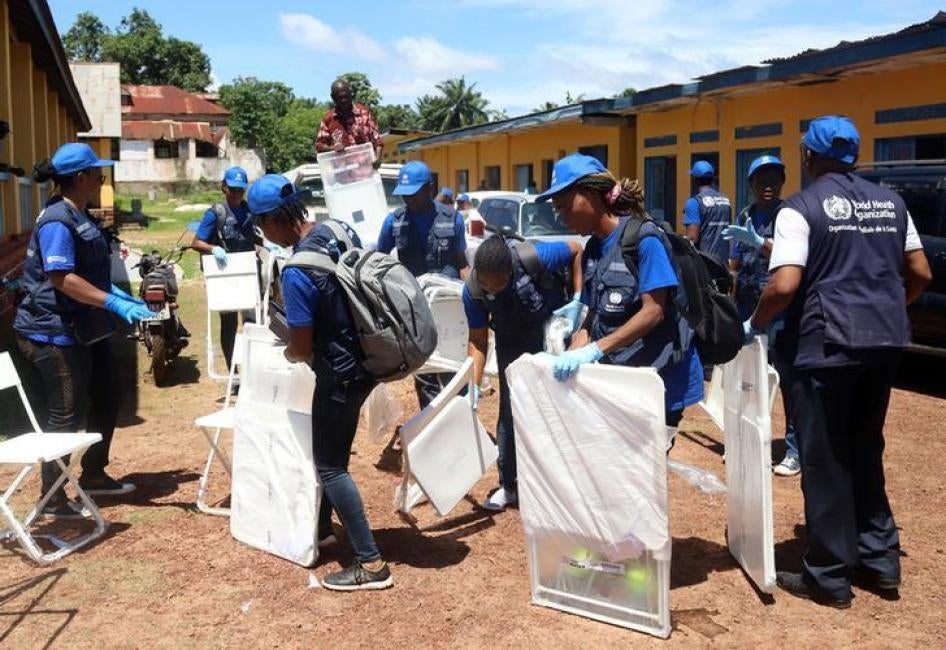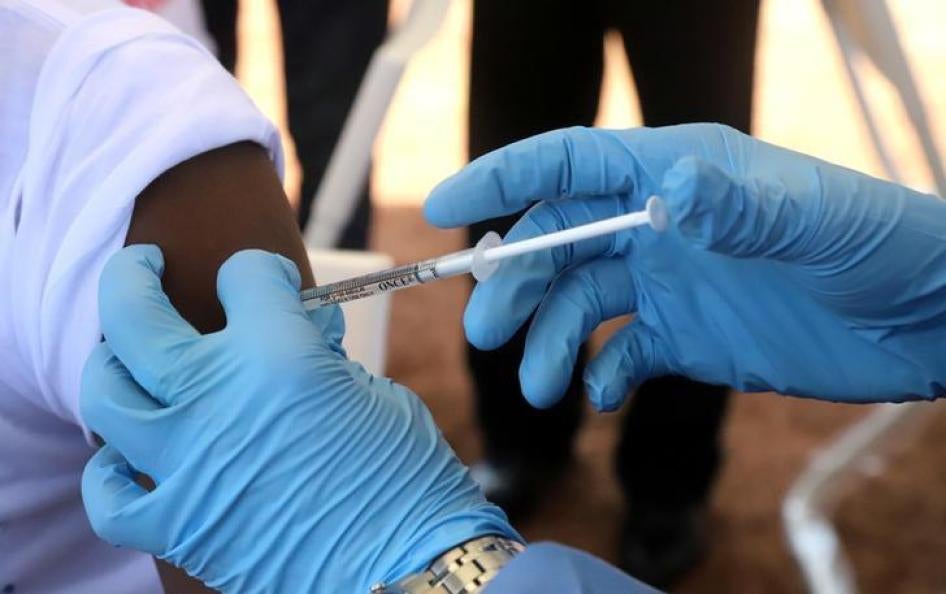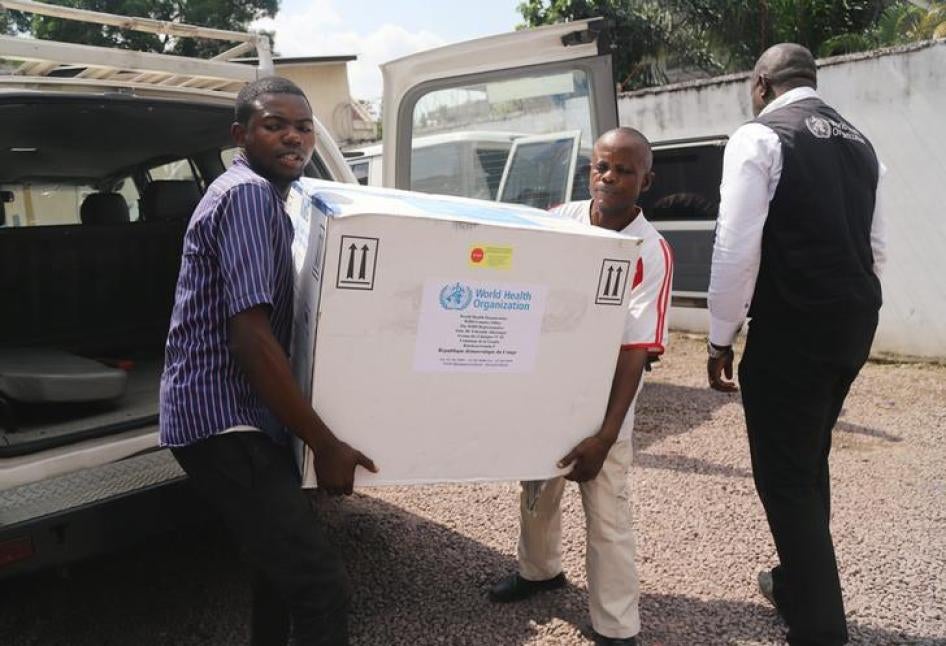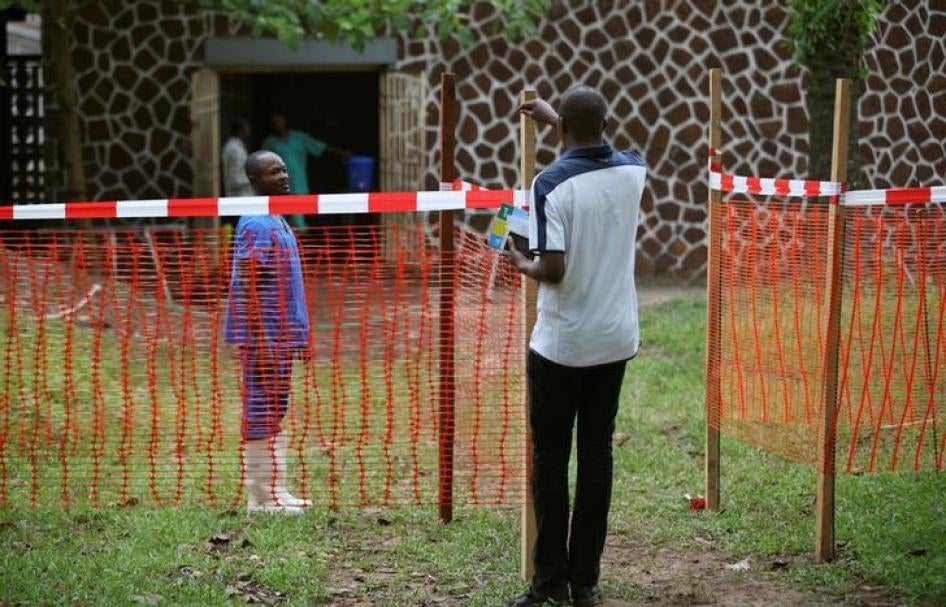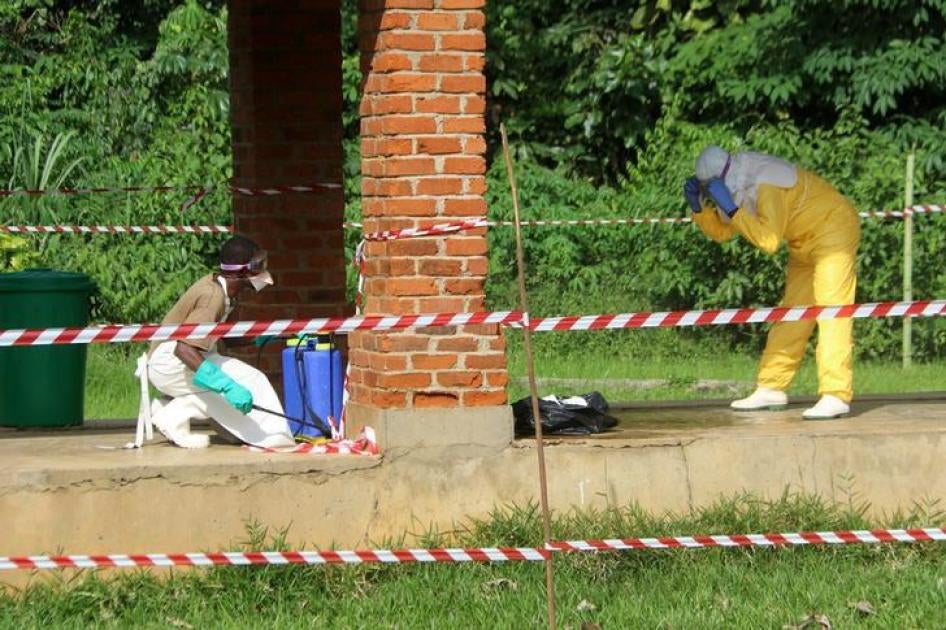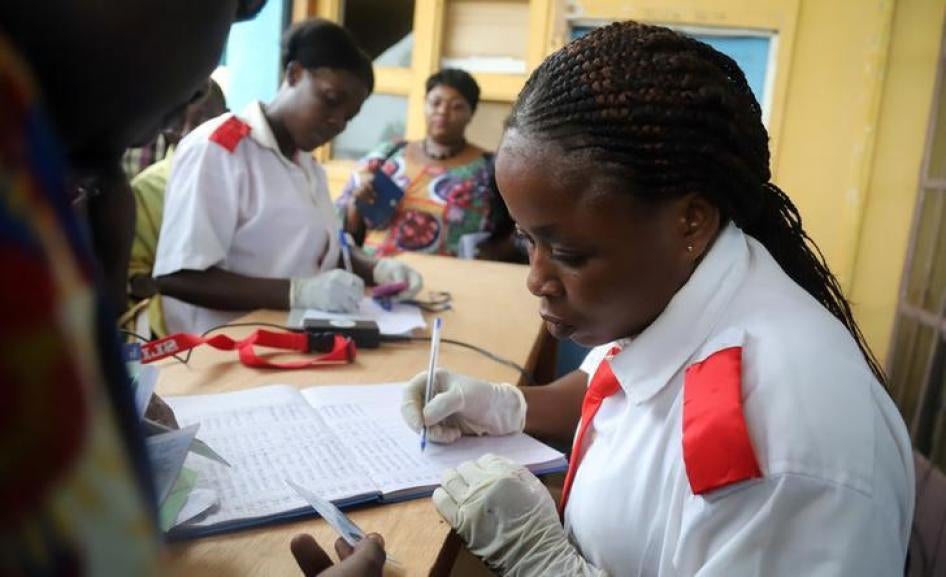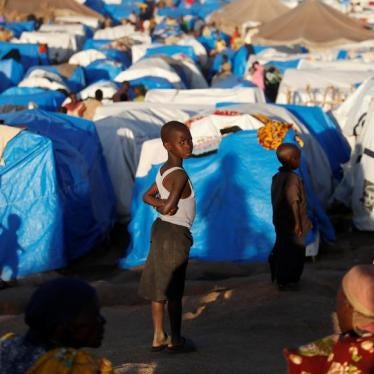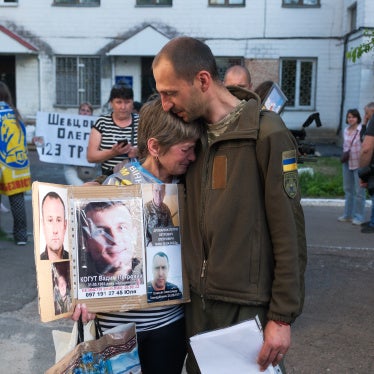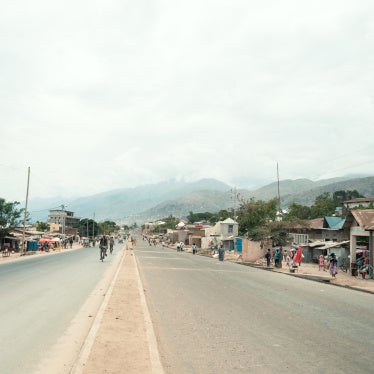On May 8, 2018, the Democratic Republic of Congo’s health minister declared an outbreak of Ebola, the highly deadly disease that killed more than 11,000 people in West Africa between 2014 and 2016. The first cases were reported in the remote town of Bikoro, in northwestern Equateur province. However, by early June three out of four confirmed Ebola patients have died in Mbandaka, the Equateur provincial capital, a city of more than 1 million and a transport hub to Congo’s capital, Kinshasa. The World Health Organization (WHO) called news of Ebola’s spread to Mbandaka a “game-changer” that makes the risk of an international spread of the disease “particularly high.” As of late May, 55 cases had been reported, of which 37 have been confirmed. Twenty-five people have died so far; 12 deaths are directly attributed to Ebola.
Authorities and international aid organizations have vaccinated more than 1000 people so far. Nine confirmed Ebola patients have reportedly been cured already.
The following questions and answers look at the human rights implications of the Ebola outbreak in Congo.
What is the Ebola virus?
The Ebola virus was first discovered in 1976 near the Ebola River in Zaire, which is now known as the Democratic Republic of Congo. It causes a rare disease that can affect primates and humans and is believed to be carried by bats. Since the 1970s, it has caused occasional outbreaks in humans in several African countries, with by far the largest in Guinea, Liberia, and Sierra Leone in 2014-2016. More than 800 people have died during eight previous outbreaks in Congo since 1976.
The virus is transmitted between humans through contact with bodily fluids of a person who is sick with the virus or has died from it. It causes a range of symptoms, including fever, severe headaches, muscle pain, fatigue, diarrhea, vomiting, and hemorrhage, usually between 2 and 21 days after exposure.
There is no known cure so medical care focuses on alleviating symptoms, including providing fluids and electrolytes, oxygen, and medications to support blood pressure, reduce vomiting and diarrhea, and manage fever and pain. The United States Centers for Disease Control and Prevention says that these basic measures, if taken early, can significantly increase survival rates. An experimental vaccine has shown significant promise in clinical trials in West Africa, and it is now being used in Congo.
Why is Ebola so dangerous?
Ebola is highly lethal, especially in settings with weak healthcare systems, such as Congo. In the 2014-2016 outbreak in West Africa, more than 28,000 people are believed to have fallen ill with the disease and more than 11,000 of them reportedly died.
As the 2014 outbreak showed, Ebola can spread rapidly when no adequate measures are taken to contain it. A lack of information about the virus, cultural practices such as ritual washing of bodies before burial, and a lack of adequate protective equipment for health workers can facilitate the virus’ spread.
What obligations does the Congolese government have under international human rights law with respect to the Ebola outbreak? What role should the international community play?
The International Covenant on Economic, Social and Cultural Rights, which Congo ratified in 1976, recognizes that everyone has the right to the highest attainable standard of health. Governments are obligated to take effective steps for the “prevention, treatment and control of epidemic, endemic, occupational and other diseases.” This includes containing the outbreak, providing protections to people who are at especially high risk of contracting the virus, and ensuring adequate treatment to those who contract the disease. Any measures taken to protect the population from the virus that limit people’s rights and freedoms, such as quarantines, must be lawful, necessary, and proportionate.
While the Congolese government is the primary guarantor of human rights in the country, the international community has an important role to play “through international assistance and co-operation.” Placing the burden on the government alone to address the obstacles to the fulfillment of the right to health would be to ignore the political and economic difficulties that the country faces. Despite an abundance of natural resources, Congo is one of the poorest countries in the world, with weak infrastructure, poor governance, and widespread corruption without accountability.
To promote the right to health, the United Nations Committee on Economic, Social and Cultural Rights (CESCR) and the special rapporteur on the right to health have observed that, “States should ensure that their actions as members of international organizations take due account of the right to health.” The committee also has determined that “international assistance and cooperation, especially economic and technical,” should enable developing countries to fulfill their core and other obligations. The special rapporteur has indicated that governments should pay particular attention to helping other countries achieve minimum essential levels of health.
Are quarantines appropriate to contain the Ebola outbreak?
After the outbreak of the Ebola crisis in West Africa in 2014, the governments of Guinea, Liberia, and Sierra Leone all imposed quarantines, restricting people’s rights to liberty and freedom of movement as well as their livelihoods and access to health care and other rights. The quarantines were imposed on individual houses, neighborhoods, villages, and, in a few cases, entire administrative districts.
International human rights law, notably the International Covenant on Civil and Political Rights, requires that restrictions on human rights in the name of public health or a public emergency meet requirements of legality, evidence-based necessity, and proportionality. Restrictions such as quarantine or isolation of symptomatic people must, at a minimum, be provided for and carried out in accordance with the law. They must be strictly necessary to achieve a legitimate objective, the least intrusive and restrictive available to reach the objective, based on scientific evidence, neither arbitrary nor discriminatory in application, of limited duration, respectful of human dignity, and subject to review. When quarantines are imposed, governments have absolute obligations to ensure access to food, water, and health care.
The quarantines imposed during the 2014-2016 epidemic did not always meet these standards. They were often not based on scientific evidence, were applied arbitrarily, and were overly broad in implementation. The quarantines were not adequately monitored, making them ineffective from a public health perspective and disproportionately affecting people unable to evade the restrictions, including older people, the poor, and people with chronic illness or disability.
What alternatives are there to forcible quarantine or isolation to contain Ebola?
Social mobilization efforts that expand understanding of Ebola and appeals for voluntary limits on movement combined with social support – including home-based care and food aid – can be as effective as measures that restrict rights and can be achieved through community engagement and attention to the special needs of disadvantaged groups.
Congo and its international partners should ensure that people have access to health information and care and should restrict liberty or movement only if and when absolutely needed and with the protections outlined under international human rights law. As part of government’s obligation to take all necessary steps for the “prevention, treatment and control of epidemic ... diseases,” the International Covenant on Economic, Social and Cultural Rights regards as a “core obligation” providing “education and access to information concerning the main health problems in the community, including methods of preventing and controlling them.” The Congolese government and international partners should step up support for groups engaging in public health education.
Why should Congo prioritize protection of health workers?
During the 2014-2016 Ebola epidemic, domestic and international health workers repeatedly raised concerns about the lack of personal protective equipment for health workers treating actual and suspected Ebola patients, including rubber gloves, safety goggles, and protective suits. Janitors, cleaning staff, drivers, and burial staff who may come in contact with infected people or contaminated material also require protection and preventive measures. Lack of appropriate protection resulted in numerous cases of Ebola infection in health workers. Liberia, for example, lost 8 percent of its doctors, nurses, and midwives to Ebola. In the current outbreak, 3 of the 45 reported cases of Ebola in Congo by mid-May affected health workers, suggesting that Congolese health workers may face the same risks as their counterparts in West Africa in 2014-2016.
While health workers have an ethical obligation to care for their patients, even if doing so involves some degree of risk, the government has an important obligation to provide health workers and others involved in the response with appropriate training in infection control and with protective gear. The Congolese government, with the support of international donors, needs to ensure that health professionals and others involved in the response are promptly paid, and that social protection programs are in place for the families of government workers who die or become ill as a result of their work in addressing the crisis. In Congo, health workers are often poorly paid, or receive their salaries late or not at all, which has led to numerous strikes in recent years.
In 2014, fear of Ebola also led to attacks on health workers. In April 2014, an angry crowd attacked an Ebola treatment center in Macenta, 425 kilometers southeast of Guinea’s capital, Conakry, run by Doctors Without Borders (Medecins Sans Frontieres or MSF), which it accused of bringing Ebola to the city. In August 2014, people in N’Zérékoré, Guinea’s second largest city, protested spraying a market with disinfectant that they believed was infected with the Ebola virus and rioted, injuring over 50 people, including security forces. Law enforcement agencies in Congo should ensure that they can quickly, adequately, and appropriately respond if similar attacks occur.
Do women need special attention in the Ebola response?
In the 2014 Ebola epidemic and earlier outbreaks, women had greater exposure to the virus and were thus at greater risk of becoming ill. The higher exposure rate among women appears to have been the result of the roles women traditionally or disproportionately occupy – including cross-border traders, health workers, and traditional birth attendants – which put them at greater risk of coming into contact with the virus. Furthermore, women more often cared for the sick and in the case of death, traditionally wash and prepare a body for burial.
Pregnant women may be at increased risk because of increased contact with health workers, and the Ebola virus persists for months in the semen of men who have recovered from Ebola, endangering female sexual partners.
There are concerns that women will also bear the brunt of the epidemic in Congo, as they tend to fill some of the same roles.
The government of Congo and international partners responding to the crisis need to ensure that prevention efforts address the particular vulnerability of women, that women are able to get information about how to prevent and respond to the epidemic, that any obstacles to obtaining care – including financial and cultural – are removed, and that they are engaged at the community and national level in shaping the response to the crisis.
Oversight and monitoring of the Ebola response
If Congo institutes emergency measures that restrict basic rights and freedoms – including freedom of association, assembly, and movement –, as Guinea, Liberia and Sierra Leone each did in 2014, the government should ensure that restrictions on public health or public emergency grounds meet the requirements of legality, evidence-based necessity, and proportionality. Any restrictions should be clearly defined, well publicized, and subject to monitoring through public hearings before the Congolese parliament, by the national human rights commission, and by independent groups operating without unnecessary restrictions.
Over the past three years, the Congolese government has brutally repressed dissent and curtailed basic civil and political rights as President Joseph Kabila has remained in power beyond the end of his constitutionally mandated two-term limit. Security forces have killed more than 300 people during largely peaceful protests since 2015 and arrested hundreds of others, while the government has cracked down on media and civil society groups. The government should not use the Ebola crisis as a pretext to further clamp down on people’s fundamental rights.
To enhance public confidence in the Ebola response, the government should ensure transparency in the receipt and use of donations and other assistance. In 2014, Sierra Leone initially made a meaningful effort to do this by creating an Emergency Operations Center (EOC), which centralized donations, regularly published lists of donations received, and independently monitored the EOC’s “Ebola Account.” However, subsequent studies concluded that major corruption concerns marred the Ebola response.
